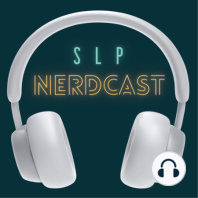67 min listen
Writing Measurable Goals and Objectives: Working Outside the Percent Correct Box
FromSLP Nerdcast
ratings:
Length:
69 minutes
Released:
Jul 6, 2020
Format:
Podcast episode
Description
Get .1 ASHA CEU hereNo matter your work environment, writing goals and objectives is probably part of your job. Why? There are a few reasons, one of which is that the ASHA Code of Ethics includes several components connecting goals and objectives to effective services. And you can’t have goals and objective without our dear friend, data.Data is a common thread that weaves itself throughout the crafting, implementation, and analysis of whether or not somebody met their goals and objectives. You need data about what a person can currently do in order to write goals that are achievable and meaningful, you need to collect data to assess the efficacy of your treatment, and data helps you determine whether or not those goals were met.There are a few guidelines to help us in this goal and objective writing process. Enter the SMART goal. An acronym referring to certain components that should be included within your goal - spoiler alert, there are at least 5 of them.Come join us as we talk through the components we should consider when writing goals, including how we are going to collect our data. Learn more about SMART goals to find out if they could help make the process of goal writing a bit easier, a bit better, and maybe even a bit more enjoyable.Learning OutcomesIdentify at least two components of quality measurement and different types of data collection that are relevant to goal writingIdentify at least two necessary considerations prior to beginning to write goalsLabel and provide at least one example for each component of a SMART goalReferencesBoavida, T., Aguiar, C., McWilliam, R., & Pimentel, J. S.(2010). Quality of Individualized Education Program goals of preschoolers with disabilities. Infants and Young Children, 23, 233–243.Diehm, E. (2017). Writing Measurable and Academically Relevant IEP Goals With 80% Accuracy Over Three Consecutive Trials. Perspectives of the ASHA Special Interest Groups, 2(16), 34-44. doi:10.1044/persp2.sig16.34 https://pubs.asha.org/doi/10.1044/persp2.SIG16.34Goodman, J. F., & Bond, L. (1993). The Individualized Education Program: A retrospective critique. The Journal of Special Education, 26, 408–422.Korsten, J. (2002). Meaningful data: Making sense of + and -. Perspectives on Augmentative and Alternative Communication, 11(3), 10-13 (https://pubs.asha.org/doi/10.1044/aac11.3.10)Olswang, L. B. & Bain, B. (1994). Monitoring children’s treatment progress. American Journal of Speech-Language Pathology, 3(3), 55-66Ruble, L., McGrew, J., Dalrymple, N., & Jung, L. (2010). Examining the quality of IEPs for young children with autism. Journal of Autism and Developmental Disorders, 40, 1460–1470.Swigert, N. (2014). Patient Outcomes, NOMS, and Goal Writing for Pediatrics and Adults. Perspectives on Swallowing and Swallowing Disorders (Dysphagia), 23(2), 65-71. doi:10.1044/sasd23.2.65Online ResourcesASHA’s National Outcomes Measurement System: https://www.asha.org/noms/ASHA’s Code of Ethicshttps://www.asha.org/Code-of-Ethics/#:~:text=The%20ASHA%20Code%20of%20Ethics,making%20related%20to%20professional%20conduct.Massachusetts Teachers Association Center for Education, Policy, and Practicehttps://massteacher.org/-/media/massteacher/files/employment-licensure/ed-evaluation/mta-student-learning-guidance.pdf?la=enTricks to Take the Pain Out of Writing Treatment Goalshttps://leader.pubs.asha.org/do/10.1044/tricks-to-take-the-pain-out-of-writing-treatment-goals/full/ASHA Roles and Responsibilities of Speech-Language Pathologists (SLPs) in Schools DOs and DON’Ts Roles and Responsibilities of SLPs in Schools Working Grouphttps://www.asha.org/uploadedFiles/Roles-Responsibilities-SLP-Schools-DOs-and-DONTs.pdfDisclosures:Financial: Kate Grandbois is the owner / founder of Grandbois Therapy + Consulting, LLC and co-founder of SLP Nerdcast. Amy Wonkka is an employee of a public school system and co-founder of SLP Nerdcast.Non-financial: Kate and Amy are both members of ASHA, SIG 12, and both serve on the AAC Advisory Grou
Released:
Jul 6, 2020
Format:
Podcast episode
Titles in the series (100)
Verbal Behavior for SLPs: In this episode we discuss verbal behavior with a focus on background information and why verbal behavior is relevant to the SLP. by SLP Nerdcast
